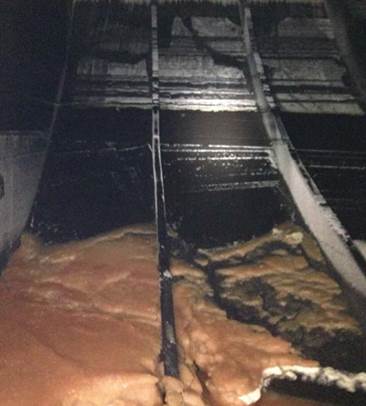There has been a reported issue with the build-up of paraffin wax in fuel tanks and engines following supply of ultra-low sulphur gas oil for use in Emission Control Areas (ECAs). This presents a technical and safety challenge for vessels.

Paraffin build up in a tank (Source: Skuld member)
Issues with certain ultra low sulphur fuels
Members have recently alerted the Association to an issue with bunkering ultra-low sulphur gas oils for use in Emission Control Areas (ECAs), particularly noting the presence of a considerable quantity of paraffin in the product offered for supply and forming in the product post supply.
In part it may be that demand for gas oil since 1 January 2015 (when the new, lower, standards for maximum sulphur content came into force) has been such that gas oil is now being sourced from a wider field and that quality standards are under pressure. The blending of biodiesel with conventional diesel fuel could in part explain this problem.
It can also be a seasonal factor, due to low temperature conditions accelerating the formation of paraffin wax, and this has been noted by BIMCO, too.
Ships should be aware of this issue as it may cause excessive build-up of sludge in the engine system and even a possible loss of power.
Loss prevention and mitigation
The Association has been advised that gas oils, as well as alternative 0.10% sulphur content fuels, available in the market are "paraffinic". If mixed with regular heavy fuels, an unstable mixture may follow.
Part of good on-board loss prevention will therefore be the avoidance of the mixing of residual fuels and distillate products.
As there will be a certain amount of mixing, necessarily following a switch over between fuel types, in the lines to the engines (unless completely separate lines are available), it is important for the engine room to carefully check against the build-up of sludge. An excessive amount could block fuel lines leading to a loss of power.
Pour and cloud points are also important to check against. It may be necessary to ensure that gas oil is placed in to a tank with heating coils, and it is a feature of some vessels that designated MDO / gas oil tanks do not have heating coils installed.
With respect to issues causes specifically by low temperatures, the advice from BIMCO was to consider use of DMX as an alternative to DMA when in low sea temperature regions.
In all cases, it is good practice to ensure that the most appropriate fuel is sourced for a vessel, depending on her trading environment and that the engine room is kept informed about particular issues that may follow a given supply.
Further reading
The Association has previously published a number of articles on ship fuel issues.
Further information on MARPOL Annex VI matters is also available.
For vessel specific enquiries, members are asked to contact their usual Skuld business unit.
The Association is grateful to Chris Fisher of Brookes Bell for his assistance with this update. Further assistance was rendered by a Skuld Member.